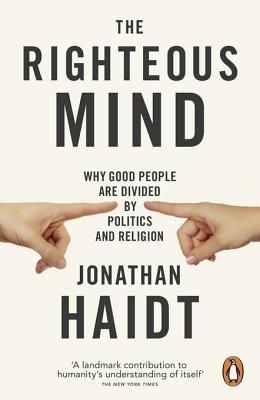More on this book
Community
Kindle Notes & Highlights
the effect of social class was much larger than the effect of city.
well-educated people in all three cities were more similar to each other than they were to their lower-class neighbors.
controlled for perceptions of harm.
There must be other sources of moral knowledge, including cultural learning (as Shweder argued), or innate moral intuitions about disgust and disrespect
invent victims.
morally dumbfounded—rendered
not reasoning in search of truth; it was reasoning in support of their emotional reactions.
research in Brazil and the United States.
The moral domain varies by culture. It is unusually narrow in Western, educated, and individualistic cultures. Sociocentric cultures broaden the moral domain to encompass and regulate more aspects of life.
People sometimes have gut feelings—particularly about disgust and disrespect—that can drive their reasoning. Moral reasoning is sometimes a post hoc fabrication.
Morality can’t be entirely self-constructed by children based on their growing understanding of harm. Cultural learning or guidance must play a larger ro...
This highlight has been truncated due to consecutive passage length restrictions.
The Intuitive Dog and Its Rational Tail
One of the greatest truths in psychology is that the mind is divided into parts that sometimes conflict.
Plato’s dialogue Timaeus.
the rationalist delusion.
Jefferson gives us a third option, in which reason and sentiment are (and ought to be) independent co-rulers,
Darwin
sympathy,
reputation.
thought that natural selection gave us minds that were preloaded with moral emotions.
“social Darwinism”—the
Radical reformers usually want to believe that human nature is a blank slate on which any utopian vision can be sketched.
The Blank Slate: The Modern Denial of Human Nature, Pinker
Edward O. Wilson,
Sociobiology: The New Synthesis.
Wilson believed that there is such a thing as human nature, and that human nature constrains the range of what we can achieve when raising our children or designing new social institutions.
Moral psychology was not about evolved emotions, it was about the development of reasoning and information processing.
Frans de Waal’s Good Natured: The Origins of Right and Wrong in Humans and Other Animals.
Descartes’ Error,
Antonio Damasio.
gut feelings and bodily reactions were necessary to think rationally,
reasoning requires the passions.
the rebirth of sociobiology in 1992 under a new name—evolutionary psychology.
“SEEING-THAT” VERSUS “REASONING-WHY”
Patterns, Thinking, and Cognition,
Howard Margolis,
Muller-Lyer illusion
Wason 4-card task,
judgment and justification are separate processes.
the basic psychology is pattern matching.
My harmless-taboo stories were like Muller-Lyer illusions:
moral reasoning
why somebody else ought to join us
useless dichotomy between cognition and emotion.
two different kinds of cognition: intuition and reasoning.
chose an elephant rather than a horse because elephants are so much bigger—and smarter—than horses.
the rider (language-based reasoning) evolved because it did something useful for the elephant.
future
new skills
the rider acts as the spokesman for the elephant,


